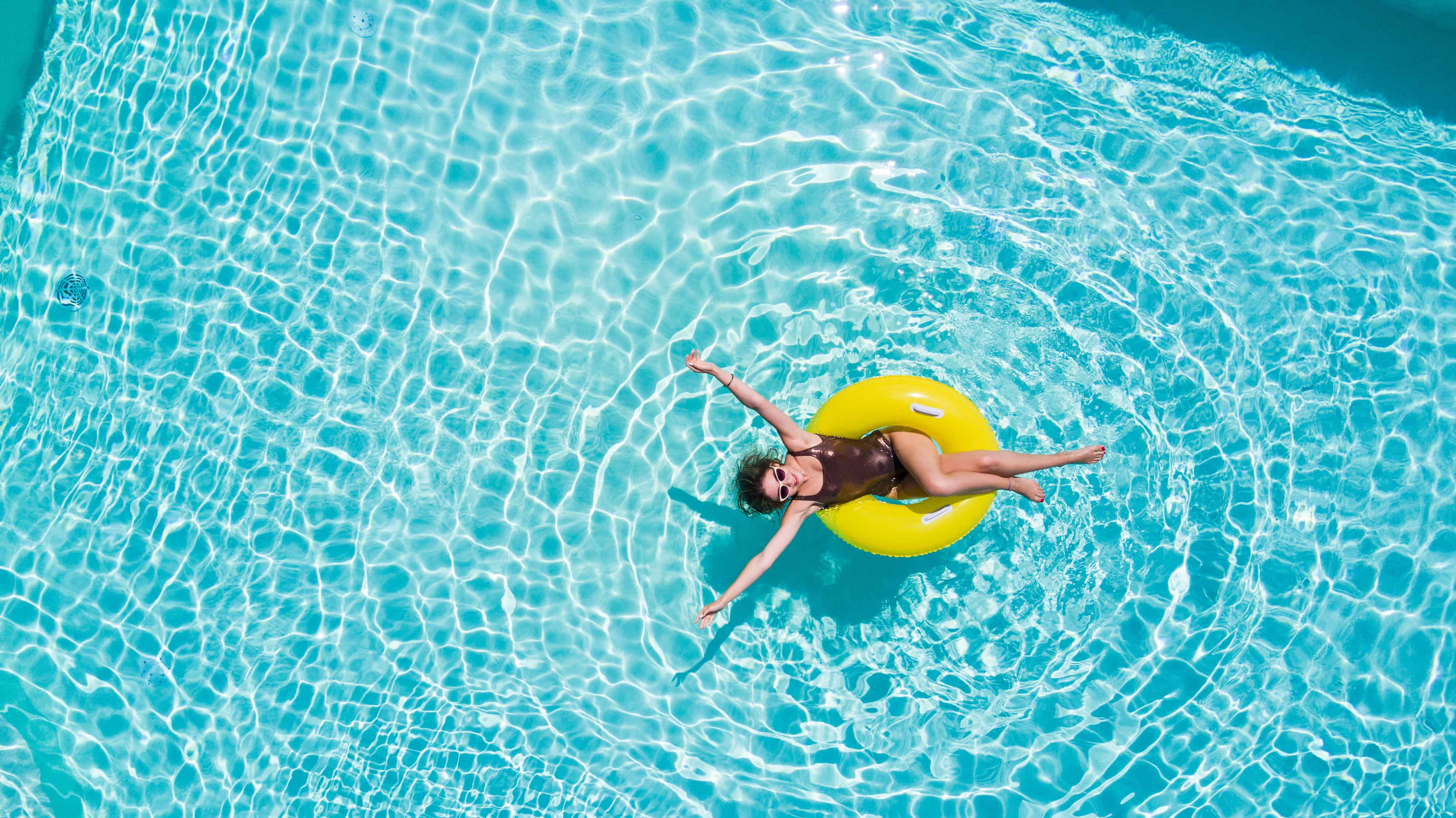Cyanuric acid is a chemical compound commonly used in both saltwater and traditional chlorine pools as a stabilizer to protect chlorine from being broken down by the sun’s UV rays. In fact, the packaged product is sometimes generically referred to as stabilizer.
Cyanuric acid is especially important for saltwater pool owners because the chlorine produced by your chlorinator contains no cyanuric acid whatsoever. Cyanuric acid protects chlorine from harmful UV rays from the sun that kills chlorine prematurely.
Cyanuric acid can be added to a saltwater pool in several ways:
- Powder form, sprinkled in by hand
- Liquid form, poured into the water
- As part of various chemical chlorine products (pucks or powder form)
In a saltwater pool, the saltwater chlorinator produces chlorine using electrolysis, which can be affected by sunlight, so cyanuric acid is necessary to maintain a stable chlorine level. Think of it like sunscreen for your pool chlorine.
Cyanuric acid protects chlorine against harmful sun rays
When added to a saltwater pool, cyanuric acid dissolves into the water and binds with the chlorine molecules, forming a more stable compound that is less susceptible to UV degradation. The ideal cyanuric acid level in a saltwater pool is between 60 and 80 ppm (parts per million).
However, too much cyanuric acid in the water can lead to a condition known as “chlorine lock,” where the chlorine becomes trapped by the cyanuric acid, making it ineffective at sanitizing the water. In this case, the only way to restore the chlorine levels is to drain and refill the pool.
To avoid over-stabilization, saltwater pool owners should regularly test the cyanuric acid levels in their pool and adjust the amount added as needed. It’s also important to note that cyanuric acid does not degrade over time and can accumulate in the water, so it may be necessary to partially drain and refill the pool to maintain a healthy balance of chemicals.
Comparing cyanuric acid forms
Cyanuric acid is typically offered in three formats:
Powder: You can buy cyanuric acid powder that is often referred to as cyanuric stabilizer. It’s typically sold in buckets.
Liquid: Cyanuric acid is also sold in liquid form in a bottle and may be referred to as instant conditioner or water conditioner. A half gallon (2L) bottle is a typical format you can buy.
Chlorine: Many chemical chlorine products such as chlorine powder and chlorine pucks include stabilizer. So when you add the chlorine to the pool, it adds necessary stabilizer, too. NOTE: Read the label because not all chemical chlorine products contain stabilizer!
Here’s a table that discusses the pros and cons of each of these 3 formats.
| Cyanuric Acid Powder | Cyanuric Acid Liquid | Chemical Chlorine with Cyanuric Acid | |
|---|---|---|---|
| Pros | |||
| Control | You have complete control over the amount of cyanuric acid added to the pool. | You have complete control over the amount of cyanuric acid added to the pool. | The amount of cyanuric acid is pre-determined, so you don’t need to worry about measuring it out. |
| Price | Cyanuric acid in powder form is usually the least expensive option. | Cyanuric acid in liquid form is slightly more expensive than the powder form, but still affordable. | Chlorine powder with cyanuric acid is usually the most expensive option, but you don’t need to buy cyanuric acid separately. |
| Storage | Cyanuric acid in powder form is easy to store and can be kept for a long time without going bad. | Cyanuric acid in liquid form takes up more space and has a shorter shelf life than the powder form. | Chlorine powder with cyanuric acid takes up more space than regular chlorine powder. |
| Cons | |||
| Dissolving | Cyanuric acid in powder form can be difficult to dissolve in water and may require extra effort to mix it properly. | Cyanuric acid in liquid form is easier to dissolve than the powder form, but may still require some mixing. | Chlorine powder with cyanuric acid may not dissolve properly and could leave residue on the bottom of the pool. |
| Corrosion | Cyanuric acid in powder form may corrode metal surfaces if it’s not properly mixed with water. | Cyanuric acid in liquid form may corrode metal surfaces if it’s not properly mixed with water. | Chlorine powder with cyanuric acid may corrode metal surfaces if it’s not properly mixed with water. |
| pH Level | Cyanuric acid can lower the pH level of the pool water, which may require additional chemicals to balance it out. | Cyanuric acid can lower the pH level of the pool water, which may require additional chemicals to balance it out. | Chlorine powder with cyanuric acid can lower the pH level of the pool water, which may require additional chemicals to balance it out. |
It’s important to note that regardless of which method you choose, you should always follow the manufacturer’s instructions and use protective gear (such as gloves and goggles) when handling chemicals.
Cyanuric powder can clog pipes if it’s poured in too quickly so this format is particularly important to add properly.
Final thoughts
Regardless of how you add cyanuric acid (stabilizer) to your saltwater pool, it’s important that you do it. Since saltwater pools produce chlorine through the chlorinator which doesn’t add stabilizer, saltwater pool owners must do it manually.
From a practical and cost perspective, adding stabilizer in powder form is probably your best bet.

